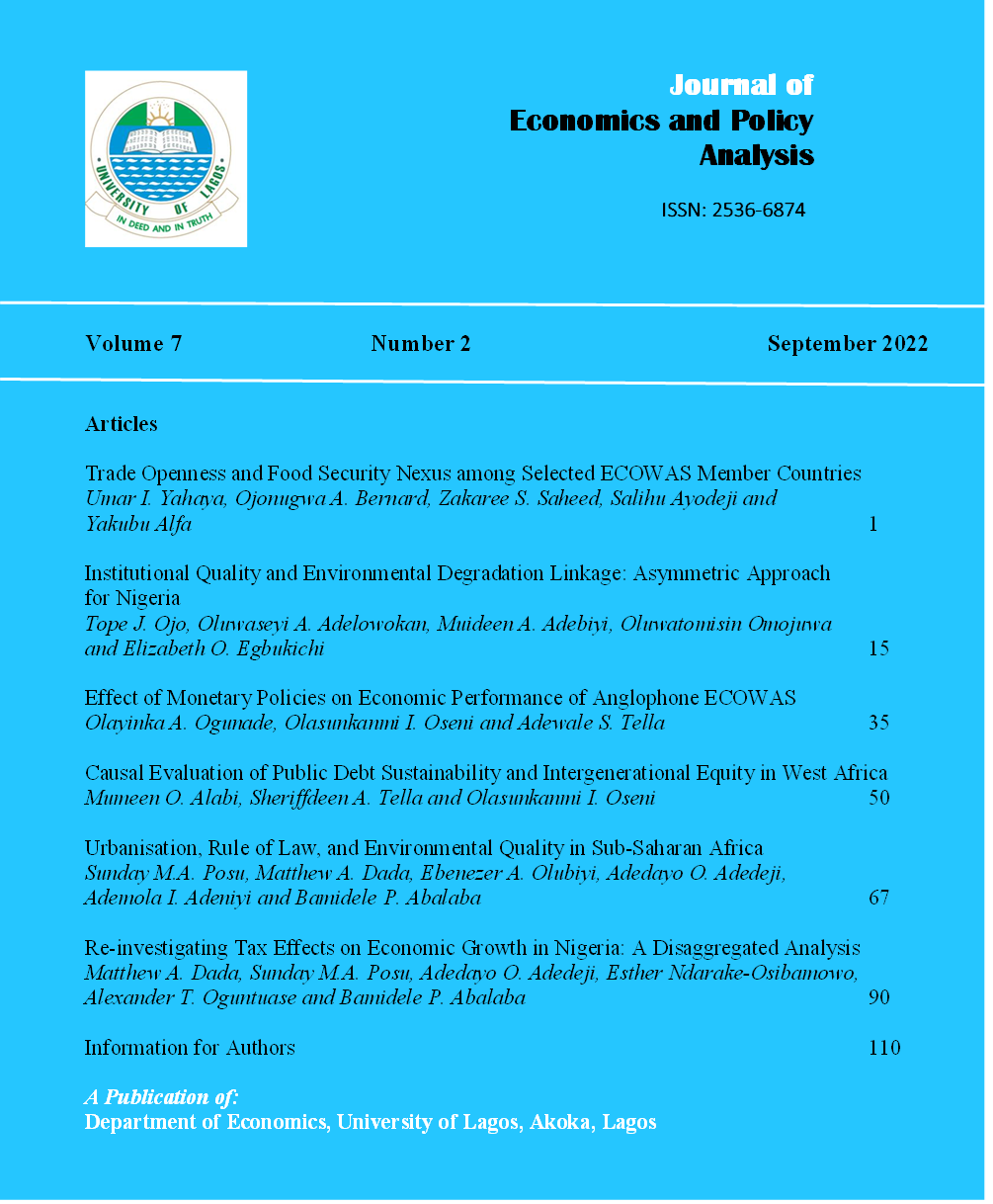Trade Openness and Food Security nexus among selected ECOWAS member countries
Abstract
The paper investigates the impact of trade on long and short run food security among ECOWAS member countries. The paper relied on Pooled Mean Group approach to capture the impact of market and policy measure of trade openness alongside macroeconomic variables on food security among ECOWAS countries using annual data spanning 2001-2022. Major findings reveal market trade openness, food inflation, political stability and population growth have significant positive impact on food security in the long run, while market trade openness, food inflation and population growth have significant short run impact in Benin, Burkina Faso, Cote d’Ivoire, Mali, Niger, Nigeria and Senegal. Findings inform the conclusion that market trade openness as against policy trade openness is a major determinant of food security in the long run in in the ECOWAS region. The study recommends in favor of full implementation of the ECOWAS customs policy by member countries. This will help eliminate food trade distorting policies and improve intra-regional food trade and hence food security in both short and long run.
References
African Economic Outlook-AEO (2019). Macroeconomic performance and prospects, Jobs, growth, and dynamism Integration for Africa's economic prosperity. African Development Bank. Retrieved from https://www.afdb.org/_leadmin/uploads/afdb/Documents/Publications/.
Awad, A., & Yussof, I. (2016). International trade and unemployment: Evidence from selected Arab Countries. Middle East Development Journal, 1(2), 198-229.
Bezuneh, M., & Yiheyis, Z. (2009). Has trade liberalization improved food availability in developing countries? An empirical analysis. International Association of Agricultural Economists Conference, Beijing, China, 16(22).
Clapp, J. (2016). Food self-sufficiency: Making sense of it, and when it makes sense. Food Policy, 66, 88-96.
ECOWAS (2008). Regional agricultural policy for West Africa: ECOWAP Paris Conference on the Regional Agricultural Policy for West Africa, 9th December, 2008.
Engel, J., & Jouanjean, M. (2013). Barriers to trade in food staples in West Africa: An analytical review. World Bank Group Report, July 2013.
FAO, IFAD, UNICEF, WFP, & WHO. (2023). The state of food security and nutrition in the world 2023. Urbanization, agrifood systems transformation and healthy diets across the rural-urban continuum. FAO: Rome.
FAO (2022). West Africa-Sahel: Food insecurity at unprecedented levels in most coastal and Sahelian countries. No. 249, FAO: Rome.
Fathelrahman, E.; Davies, S.; Muhammad, S. (2021). Food trade openness and enhancement of food security-partial equilibrium model simulations for selected countries. Sustainability, 13, 4107. https://doi.org/10.3390/su13084107.
Fuji, E. (2019). What does trade openness measure? Oxford Bulletin of Economics and Statistics, 81(4), 868-888.
Fusco, G., Coluccia, C., & De Leo, F. (2020). Effect of trade openness on food security in the EU: A dynamic panel analysis. International Journal of Environmental Research and Economic Health.
Global Food Security Strategy (2019). West Africa regional plan. Feeding the Future, The US Government’s Global Hunger and Food Security Initiative, September 2019.
Hadri, K. (2000). Testing for stationarity in heterogeneous panel data. Econometric Journal, 3, 148-161.
Ibitayo O., & Ibitayo A. (2020). Determinants of intra-ECOWAS regional food trade: An augmented gravity model approach. Journal of Global Economics, Management and Business Research, 12(4), 30-46.
Ijirshar, V. U. (2019). Impact of trade openness on economic growth among ECOWAS countries: 1975-2017. CBN Journal of Applied Statistics, 10(1).
Ikechi, K. S., Chinedum, A. H., Nwokoro, N. A. (2022). Trade relations and trade openness among ECOWAS member nations. International Journal of Management Science and Business Administration, 8(2), 33-47. DOI: 10.18775/ijmsba.1849-5664-5419.2014.82.1004.
Im, K. S., Pesaran, M. H., & Shin, Y. (2003). Testing for unit roots in heterogeneous panels. Journal of Econometrics, 115, 53{74.
Levin, A., Lin, C. F., & Chu, C. (2002). Unit root tests in panel data: asymptotic and finite-sample properties. Journal of Econometrics, 108, 1(24).
Mary, S. (2019). Hungry for free trade? Food trade and extreme hunger in developing countries. Food Security, 11(2), 461-477.
Shaw, D. J. (2007). World Food Security. A History since 1945. Palmgrave Macmillan, New York.
Staatz, J. M., Diallo, B., & Dembele, N. (2017). Policy responses to West Africa’s agricultural development challenges. In strengthening regional agricultural integration in West Africa: Key findings and policy implications. Basel: Syngenta Foundation for Sustainable Agriculture, 223–239. https://www.syngentafoundation.org/sites/g/files/zhg576/f/
Tinta, A. A., Sarpong, D. B., Ouedraogo, M. I., Hassan, R. I., Bonsu, A. M., & Onuba, E. O. (2018). Assessing the impact of integration on economic growth and food security in ECOWAS. Theoretical and Practical Research in Economic Field. 6(1). DOI: http://dx.doi.org/10.14505/tpref
Ugwuja, A., & Chukwukere, A. (2021). Trade protectionism and border closure in Nigeria: The rice economy in perspective. UJAH, 22(1), http://dx.doi./org/10.4314/ujah.v22i1.4.
United Nations Comrade (2023). UN Comrade database. Available at the World Integrated Trade Solution online database https://wits.worldbank.org/, 2023.
World Bank (2022). World Development Indicators. Retrieved from https://data.worldbank.org/country.
Yahaya, U. I. (2023). Food security and trade policy effectiveness in the ECOWAS region: A review of existing evidence. Academy Journal of Multidisciplinary Research, 1(1), 1.


